The Automotive Energy Storage System Market is estimated to be valued at USD 67.1 billion in 2025 and is projected to reach USD 194.1 billion by 2035, registering a compound annual growth rate (CAGR) of 11.2% over the forecast period.
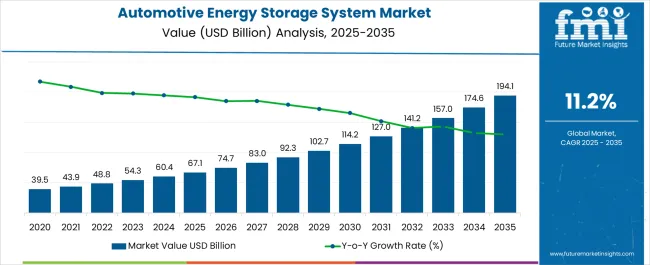
| Metric | Value |
|---|---|
| Automotive Energy Storage System Market Estimated Value in (2025 E) | USD 67.1 billion |
| Automotive Energy Storage System Market Forecast Value in (2035 F) | USD 194.1 billion |
| Forecast CAGR (2025 to 2035) | 11.2% |
The Automotive Energy Storage System market is experiencing strong growth, driven by the global shift toward electric mobility and sustainable transportation solutions. Increasing adoption of electric vehicles, government incentives for low-emission vehicles, and stricter emission regulations are contributing to expanding demand for advanced energy storage systems. Continuous advancements in battery chemistry, energy density, and thermal management are enhancing vehicle performance and driving range, which is further supporting market adoption.
Integration of energy storage systems with electric drivetrains and vehicle management platforms allows for improved efficiency, safety, and reliability. Rising investments in research and development by automakers and energy storage manufacturers are accelerating innovation and cost optimization.
Additionally, the growing emphasis on renewable energy integration, smart grid compatibility, and vehicle-to-grid technology is creating new opportunities for energy storage solutions As consumers and commercial fleets increasingly prioritize sustainable and high-performance mobility options, the market is expected to witness sustained growth, with technological advancements and regulatory support serving as key drivers for adoption over the coming decade.
The automotive energy storage system market is segmented by vehicle type, product type, form, and geographic regions. By vehicle type, automotive energy storage system market is divided into Passenger Car and Electric Vehicles. In terms of product type, automotive energy storage system market is classified into Batteries, Flywheel, and Super Capacitors. Based on form, automotive energy storage system market is segmented into Electrical, Mechanical, and Others. Regionally, the automotive energy storage system industry is classified into North America, Latin America, Western Europe, Eastern Europe, Balkan & Baltic Countries, Russia & Belarus, Central Asia, East Asia, South Asia & Pacific, and the Middle East & Africa.
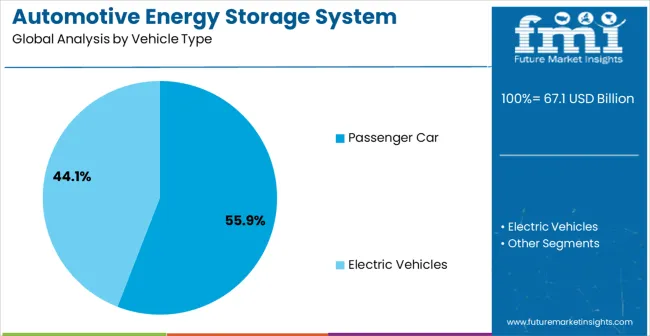
The passenger car segment is projected to hold 55.9% of the market revenue in 2025, establishing it as the leading vehicle type. Growth in this segment is being driven by the rapid adoption of electric passenger vehicles, supported by government incentives, stricter emission standards, and increasing consumer demand for environmentally friendly transportation. Energy storage systems are being integrated into passenger cars to enhance driving range, efficiency, and reliability.
Advances in battery technologies, including improved energy density, longevity, and safety features, are further accelerating adoption. Passenger cars are benefiting from optimized power management systems that ensure better performance while minimizing energy losses.
The ability to retrofit or upgrade energy storage systems through modular designs provides flexibility for manufacturers and consumers alike As automakers continue to expand electric vehicle offerings and promote sustainable mobility, the passenger car segment is expected to maintain its leading position, driven by ongoing technological innovations, regulatory support, and growing consumer acceptance of electrified transportation solutions.
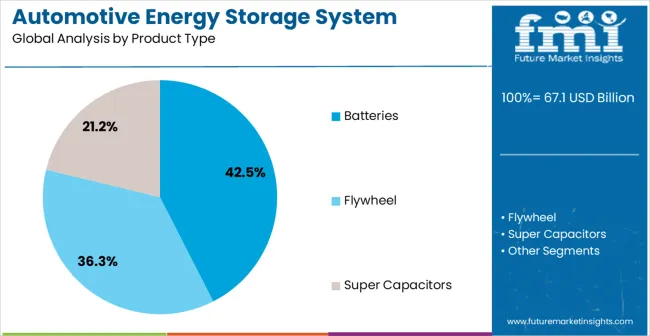
The batteries product type segment is anticipated to account for 42.5% of the market revenue in 2025, making it the dominant product category. Growth is being driven by the increasing need for high-performance energy storage solutions capable of delivering extended driving range, rapid charging, and long lifecycle durability. Advances in lithium-ion, solid-state, and alternative battery chemistries have improved energy density, thermal stability, and safety, thereby enhancing vehicle performance and consumer confidence.
Batteries are being integrated into passenger vehicles, commercial fleets, and hybrid systems, supporting both efficiency and sustainability goals. Modular battery designs allow scalability and ease of replacement, which reduces total cost of ownership and improves operational reliability.
Growing investments by automotive manufacturers, battery developers, and research institutions are accelerating innovation and adoption across global markets As the demand for electric and hybrid vehicles continues to rise, the batteries product type segment is expected to maintain leadership, supported by technological advancements and increasing infrastructure for charging and energy management systems.
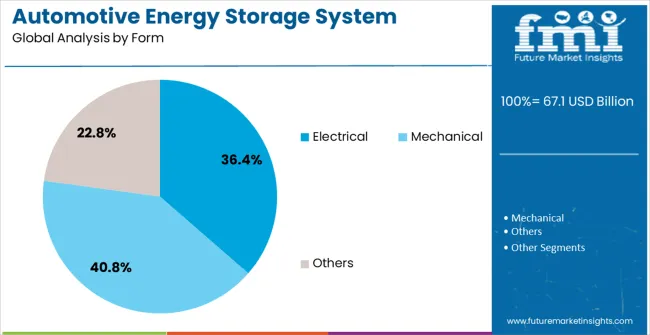
The electrical form segment is projected to hold 36.4% of the market revenue in 2025, establishing it as the leading form category. Growth is driven by the shift from conventional mechanical or hybrid energy storage to fully electrical systems, which enable higher efficiency, improved vehicle performance, and reduced emissions.
Electrical energy storage systems allow for precise power management, real-time monitoring, and integration with electric drivetrains and vehicle control systems, enhancing operational reliability. Adoption is further supported by advances in battery management systems, inverters, and energy optimization technologies that improve efficiency and safety.
The electrical form provides flexibility for modular deployment in passenger vehicles, commercial fleets, and other mobility solutions, facilitating scalability and cost-effectiveness As automotive electrification gains momentum and governments implement policies promoting zero-emission vehicles, the electrical segment is expected to remain the preferred choice, driven by continuous innovation, improved energy density, and alignment with global sustainability initiatives.
Growing consumption of fossil fuels for transportation purposes is one of the key reasons behind the upsurge in carbon dioxide levels in the atmosphere. The problem of increasing global warming and scarcity of fossil fuels have to lead the development of alternate technologies.
This growing demand for alternate technologies is, in turn, driving the growth of the automotive energy storage system market. Energy storage systems are used to store electric energy, which is then released when required. Moreover, increasing adoption of renewable energy resources will create demand for energy storage systems in the transportation sector.
Now days, automotive energy storage systems are attracting a great deal of attention as they are proving to be of great help in the transformation towards a low carbon and clean energy future. In most of the countries, the demand for electric vehicles is increasing day by day. Governments across the globe are providing subsidies, loans and many more benefits for purchasing electric vehicles.
For instance, in the USA, the federal Internal Revenue Service (IRS) provides tax credit of $2,500 to $7,500 on every new purchase of electric vehicles. Similarly, the UK government provides financial support and tax incentives to support the demand for electric vehicles. Given the aforementioned reasons, the demand for electric vehicles will increase, which, in turn, will spur the demand for automotive energy storage systems over the forecast period.
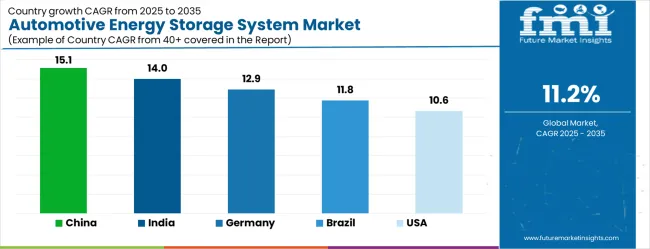
| Country | CAGR |
|---|---|
| China | 15.1% |
| India | 14.0% |
| Germany | 12.9% |
| Brazil | 11.8% |
| USA | 10.6% |
| UK | 9.5% |
| Japan | 8.4% |
The Automotive Energy Storage System Market is expected to register a CAGR of 11.2% during the forecast period, exhibiting varied country level momentum. China leads with the highest CAGR of 15.1%, followed by India at 14.0%. Developed markets such as Germany, France, and the UK continue to expand steadily, while the USA is likely to grow at consistent rates. Japan posts the lowest CAGR at 8.4%, yet still underscores a broadly positive trajectory for the global Automotive Energy Storage System Market. In 2024, Germany held a dominant revenue in the Western Europe market and is expected to grow with a CAGR of 12.9%. The USA Automotive Energy Storage System Market is estimated to be valued at USD 23.3 billion in 2025 and is anticipated to reach a valuation of USD 23.3 billion by 2035. Sales are projected to rise at a CAGR of 0.0% over the forecast period between 2025 and 2035. While Japan and South Korea markets are estimated to be valued at USD 3.2 billion and USD 2.0 billion respectively in 2025.
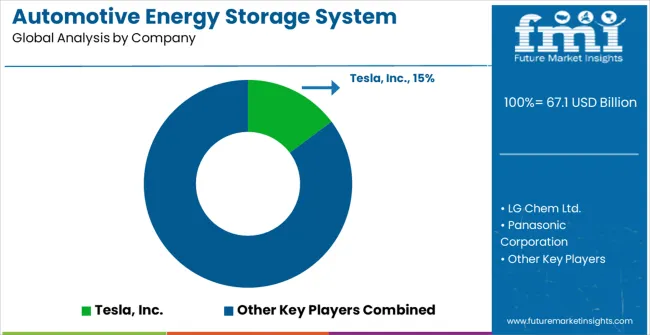
| Item | Value |
|---|---|
| Quantitative Units | USD 67.1 Billion |
| Vehicle Type | Passenger Car and Electric Vehicles |
| Product Type | Batteries, Flywheel, and Super Capacitors |
| Form | Electrical, Mechanical, and Others |
| Regions Covered | North America, Europe, Asia-Pacific, Latin America, Middle East & Africa |
| Country Covered | United States, Canada, Germany, France, United Kingdom, China, Japan, India, Brazil, South Africa |
| Key Companies Profiled | Tesla, Inc., LG Chem Ltd., Panasonic Corporation, Samsung SDI Co., Ltd., BYD Company Limited, Contemporary Amperex Technology Co. Limited (CATL), Johnson Controls International plc, A123 Systems LLC, Robert Bosch GmbH, GS Yuasa Corporation, Saft Groupe S.A., EnerSys, and Exide Technologies |
The global automotive energy storage system market is estimated to be valued at USD 67.1 billion in 2025.
The market size for the automotive energy storage system market is projected to reach USD 194.1 billion by 2035.
The automotive energy storage system market is expected to grow at a 11.2% CAGR between 2025 and 2035.
The key product types in automotive energy storage system market are passenger car, _lcv, _hcv, electric vehicles, _phev (plug in hybrid vehicles) and _hev.
In terms of product type, batteries segment to command 42.5% share in the automotive energy storage system market in 2025.






Our Research Products

The "Full Research Suite" delivers actionable market intel, deep dives on markets or technologies, so clients act faster, cut risk, and unlock growth.

The Leaderboard benchmarks and ranks top vendors, classifying them as Established Leaders, Leading Challengers, or Disruptors & Challengers.

Locates where complements amplify value and substitutes erode it, forecasting net impact by horizon

We deliver granular, decision-grade intel: market sizing, 5-year forecasts, pricing, adoption, usage, revenue, and operational KPIs—plus competitor tracking, regulation, and value chains—across 60 countries broadly.

Spot the shifts before they hit your P&L. We track inflection points, adoption curves, pricing moves, and ecosystem plays to show where demand is heading, why it is changing, and what to do next across high-growth markets and disruptive tech

Real-time reads of user behavior. We track shifting priorities, perceptions of today’s and next-gen services, and provider experience, then pace how fast tech moves from trial to adoption, blending buyer, consumer, and channel inputs with social signals (#WhySwitch, #UX).

Partner with our analyst team to build a custom report designed around your business priorities. From analysing market trends to assessing competitors or crafting bespoke datasets, we tailor insights to your needs.
Supplier Intelligence
Discovery & Profiling
Capacity & Footprint
Performance & Risk
Compliance & Governance
Commercial Readiness
Who Supplies Whom
Scorecards & Shortlists
Playbooks & Docs
Category Intelligence
Definition & Scope
Demand & Use Cases
Cost Drivers
Market Structure
Supply Chain Map
Trade & Policy
Operating Norms
Deliverables
Buyer Intelligence
Account Basics
Spend & Scope
Procurement Model
Vendor Requirements
Terms & Policies
Entry Strategy
Pain Points & Triggers
Outputs
Pricing Analysis
Benchmarks
Trends
Should-Cost
Indexation
Landed Cost
Commercial Terms
Deliverables
Brand Analysis
Positioning & Value Prop
Share & Presence
Customer Evidence
Go-to-Market
Digital & Reputation
Compliance & Trust
KPIs & Gaps
Outputs
Full Research Suite comprises of:
Market outlook & trends analysis
Interviews & case studies
Strategic recommendations
Vendor profiles & capabilities analysis
5-year forecasts
8 regions and 60+ country-level data splits
Market segment data splits
12 months of continuous data updates
DELIVERED AS:
PDF EXCEL ONLINE
Automotive Energy Recovery Systems Market Size and Share Forecast Outlook 2025 to 2035
Battery Energy Storage System Industry Analysis by Battery Type, Connection Type, Ownership, Energy Capacity, Storage System, Application, and Region through 2025 to 2035
Advanced Energy Storage System Market Size and Share Forecast Outlook 2025 to 2035
Energy Storage Sodium Ion Battery Market Size and Share Forecast Outlook 2025 to 2035
Automotive Energy Absorption (EA) Pads Market Size and Share Forecast Outlook 2025 to 2035
Automotive Brake System Market Growth - Trends & Forecast 2025 to 2035
Automotive Brake System & Components Market Growth - Trends & Forecast 2025 to 2035
Automotive Piston System Market Growth - Trends & Forecast 2025 to 2035
Automotive Washer System Market Trends - Growth & Forecast 2025 to 2035
Energy Management System Market Analysis – Growth & Forecast 2017-2025
Automotive Seating Systems Market Analysis - Size, Share & Forecast 2025 to 2035
Automotive Exhaust Systems Market Trends - Growth & Forecast 2025 to 2035
Automotive Starting System Market Size and Share Forecast Outlook 2025 to 2035
Automotive Ignition Systems Market Size and Share Forecast Outlook 2025 to 2035
Automotive Steering System Market Growth - Trends & Forecast 2025 to 2035
Automotive Embedded System Market Growth - Trends & Forecast 2024 to 2034
Automotive Defogger System Market
ASEAN Energy Storage Devices Market
Automotive Platooning System Market Size and Share Forecast Outlook 2025 to 2035
Automotive Gear Shift System Market Size and Share Forecast Outlook 2025 to 2035

Thank you!
You will receive an email from our Business Development Manager. Please be sure to check your SPAM/JUNK folder too.
Chat With
MaRIA